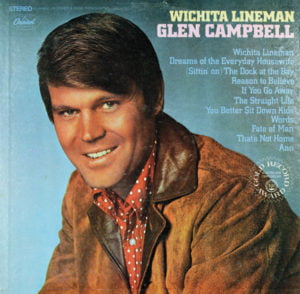May 7, 2021 —– Chart #90
Hello Musical Friends,
Welcome to Friday and the 90th edition of Chart of the Day. What a beautiful day it is here in Richardson Texas! Jimmy Webb is one of the greatest song writers of our day and today I have selected one of his best tunes and a favorite of mine. “Wichita Lineman” is a song written by the American songwriter Jimmy Webb in 1968. It was first recorded by the American country music artist Glen Campbell with backing from members of the Wrecking Crew and was widely covered by other artists.
Campbell’s version, which appeared on his 1968 album of the same name, reached number 3 on the US pop chart, remaining in the Top 100 for 15 weeks. In addition, the song topped the American country music chart for two weeks and the adult contemporary chart for six weeks. It was certified gold by the RIAA in January 1969. The song reached number 7 in the United Kingdom. In Canada, the single topped both the RPM national and country singles charts. As of August 2017 the song had also sold 357,000 downloads in the digital era in the United States.
In 2010, Rolling Stone magazine’s list of the “500 Greatest Songs of All Time” ranked “Wichita Lineman” at number 195. It has been referred to as “the first existential country song”. British music journalist Stuart Maconie called it “the greatest pop song ever composed”; and the BBC referred to it as “one of those rare songs that seems somehow to exist in a world of its own – not just timeless but ultimately outside of modern music”. “Wichita Lineman” was featured in series 12 of BBC Radio 4’s Soul Music, a documentary series featuring stories behind pieces of music with a powerful emotional impact. In 2020, the song was selected by the Library of Congress for preservation in the National Recording Registry for being “culturally, historically, or aesthetically significant”
The song consists of two verses, each divided into two parts. The first part is in the key of F major, while the second is written in D major. D represents the relative minor position to F, so a D minor (as opposed to major) section would be expected. The fact that it is nevertheless set in D major arguably contributes to the unique and appealing character of the song.
The lyrics follow the key dichotomy, with the first part of each verse (F major) handling issues related to a lineman’s job (e.g. “searchin’ in the sun for another overload”, “if it snows, that stretch down South won’t ever stand the strain”), whereas the second part (D major) dwells on the lineman’s romantic thoughts. Set off against the F major of the first part, the D major of the second part sounds distinctively mellow, which is consistent with its content.
Glen Travis Campbell (April 22, 1936 – August 8, 2017) was an American guitarist, singer, songwriter, actor and television host. He was best known for a series of hit songs in the 1960s and 1970s, and for hosting The Glen Campbell Goodtime Hour on CBS television from 1969 until 1972. He released 64 albums in a career that spanned five decades, selling over 45 million records worldwide, including twelve gold albums, four platinum albums, and one double-platinum album.
Born in Billstown, Arkansas, Campbell began his professional career as a studio musician in Los Angeles, spending several years playing with the group of instrumentalists later known as “The Wrecking Crew”. After becoming a solo artist, he placed a total of 80 different songs on either the Billboard Country Chart, Billboard Hot 100, or Adult Contemporary Chart, of which 29 made the top 10 and of which nine reached number one on at least one of those charts. Among Campbell’s hits are “Universal Soldier”, his first hit from 1965, along with “Gentle on My Mind” (1967), “By the Time I Get to Phoenix” (1967), “Dreams of the Everyday Housewife” (1968), “Wichita Lineman” (1968), “Galveston” (1969), “Rhinestone Cowboy” (1975) and “Southern Nights” (1977).
In 1967, Campbell won four Grammys in the country and pop categories. For “Gentle on My Mind”, he received two awards in country and western; “By the Time I Get to Phoenix” did the same in pop. Three of his early hits later won Grammy Hall of Fame Awards (2000, 2004, 2008), while Campbell himself won the Grammy Lifetime Achievement Award in 2012. He owned trophies for Male Vocalist of the Year from both the Country Music Association (CMA) and the Academy of Country Music (ACM), and took the CMA’s top award as 1968 Entertainer of the Year. Campbell played a supporting role in the film True Grit (1969), which earned him a Golden Globe nomination for Most Promising Newcomer. He also sang the title song, which was nominated for an Academy Award.
Campbell was diagnosed with Alzheimer’s disease in 2010. In March 2016 it was confirmed that Campbell was in the final stages of Alzheimer’s disease and he died in 2017.
A nice live performance with full orchestra on PPBS: https://youtu.be/rjzTNWWO7U0
In case you are doubting me on just how accomplished Gen was on guitar, check this one out: https://youtu.be/S4PEf7yYCZE or this one: https://youtu.be/GUBhE00h9U0
Keep rockin’ my friends,
Stan
